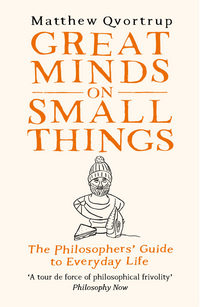 Great Minds on Small Things:
Great Minds on Small Things:
The Philosophers’ Guide to Everyday Life
DETAILS: Publisher: Duckworth Books Publication Date: October 5, 2023 Format: eARC Length: 224 pg. Read Date: March 21-29, 2024

What’s Great Minds on Small Things About?
In 1764, Voltaire published Dictionnaire philosophique. In 1957, Roland Barthes published Mythologies. In 1987, Quiddities: An Intermittently Philosophical Dictionary was published by W. V. Quine. Taking a little something from all of these (and others), in 2023, Matthew Qvortrup brought us Great Minds on Small Things: The Philosophers’ Guide to Everyday Life.
This is a (brief) survey of what philosophers from Plato to George Santayana, and several points between (and a little spillover on either side) have to say about topics that aren’t usually thought of as subjects of philosophical meditation. More like things discussed over beers with coworkers and friends, pontificated on by stand-up comics, or things that people mutter about on social media between photos of sandwiches or cats.
Rather than the meaning of life, the source of ethics, the nature of the will, or social contracts, Qvortrup collects thoughts on things like artichokes, smoking, hiccups, sports, sports, and more sports. Told with a little bit of humor and a clear familiarity with the thinkers and writers he’s covering and quoting, Qvortrup’s survey is both entertaining and educational.
The Breadth of Topics
Qvortrup hits on so many things–here’s a (very non-exhaustive) list that I compiled to give you a taste (the categories are mine, Qvortrup lists things alphabetically). The things I didn’t jot down are just as varied and strange, let me add.
 Artichoke
Artichoke Beer
Beer Breakfast
Breakfast Cheese
Cheese Coffee
Coffee Quiche
Quiche Radishes
Radishes Tea
Tea Tomato Juice
Tomato Juice Wine
Wine
Inventions
 Boilers
Boilers
 Cars
Cars
 Ships
Ships
 Telephone
Telephone
Pets
 Cats
Cats
 Dogs
Dogs
Activities
 Baseball
Baseball
 Basketball
Basketball
 Dancing
Dancing
 Football*
Football*
 Being Lazy
Being Lazy
 Marriage
Marriage
 Smoking
Smoking
 Sneezing
Sneezing
 Tennis
Tennis
 Wrestling
Wrestling
Human Bodies
 Excrement
Excrement
 Farting
Farting
 Hiccups
Hiccups
 Laughter
Laughter
 Penis
Penis
 Ticklishness
Ticklishness
 Urination
Urination
 Winking
Winking
 Wiping (no, really)
Wiping (no, really)
 Yawning
Yawning
* Sorry, Americans, he means “soccer.”
And, sure, while this is about everyday things, Qvortrup does interact with some of the deeper thinkers in (mostly Western) history, and does end up brushing up against some of their deeper thoughts and categories–so, he includes a glossary to help readers like me get through it all.
One Problem with the Tone
Yes, I enjoy writers mixing humor (mild or otherwise) with deeper or controversial topics. Even just a lighter touch to writing is a winner for me. And Qvortrup makes this whole thing really amusing.
Sometimes, however, I had a hard time telling when he was exaggerating for humorous effect or just making a joke and when he was conveying actual information in a whimsical way. It doesn’t take away the enjoyment from the reading–it just makes it hard to know what you can repeat in conversation or cite in writing (you know, if you’re the kind of person who does that.)
So, what did I think about Great Minds on Small Things?
I had a great time reading this book–it’s a great mix of light reading with some interesting perspectives–and can easily be used as a launching point to further reading or research. “So-and-so used baseball to describe X economic principle, I want to see how that actually works out beyond this quick summary.” “Hanna Arendt’s personal story seems interesting, especially how it is expressed in Topic Y.” It’s also just fun to think about names you’ve read about (or maybe read) debating the type of breakfast that’s best for productivity or enjoyment of life.
I do think it’s best to dip in and out of the book, and not read from cover-to-cover the way I did. When I return, it will be to look at particular topics (not necessarily the ones I listed above).
My major complaint is the brevity of the book–I don’t think most of the entries needed to be longer, I just wanted more entries. Some letters only have one thing listed. Sure, it has to be difficult to find everyday things that philosophers have opined about, but now that Qvortrup has shown us some, it’s hard to believe there isn’t more to see.
Pick this one up, folks, you’ll have a good time.

Disclaimer: I received a copy of this book from Duckworth Books via NetGalley—thanks to both for this.
![]()

